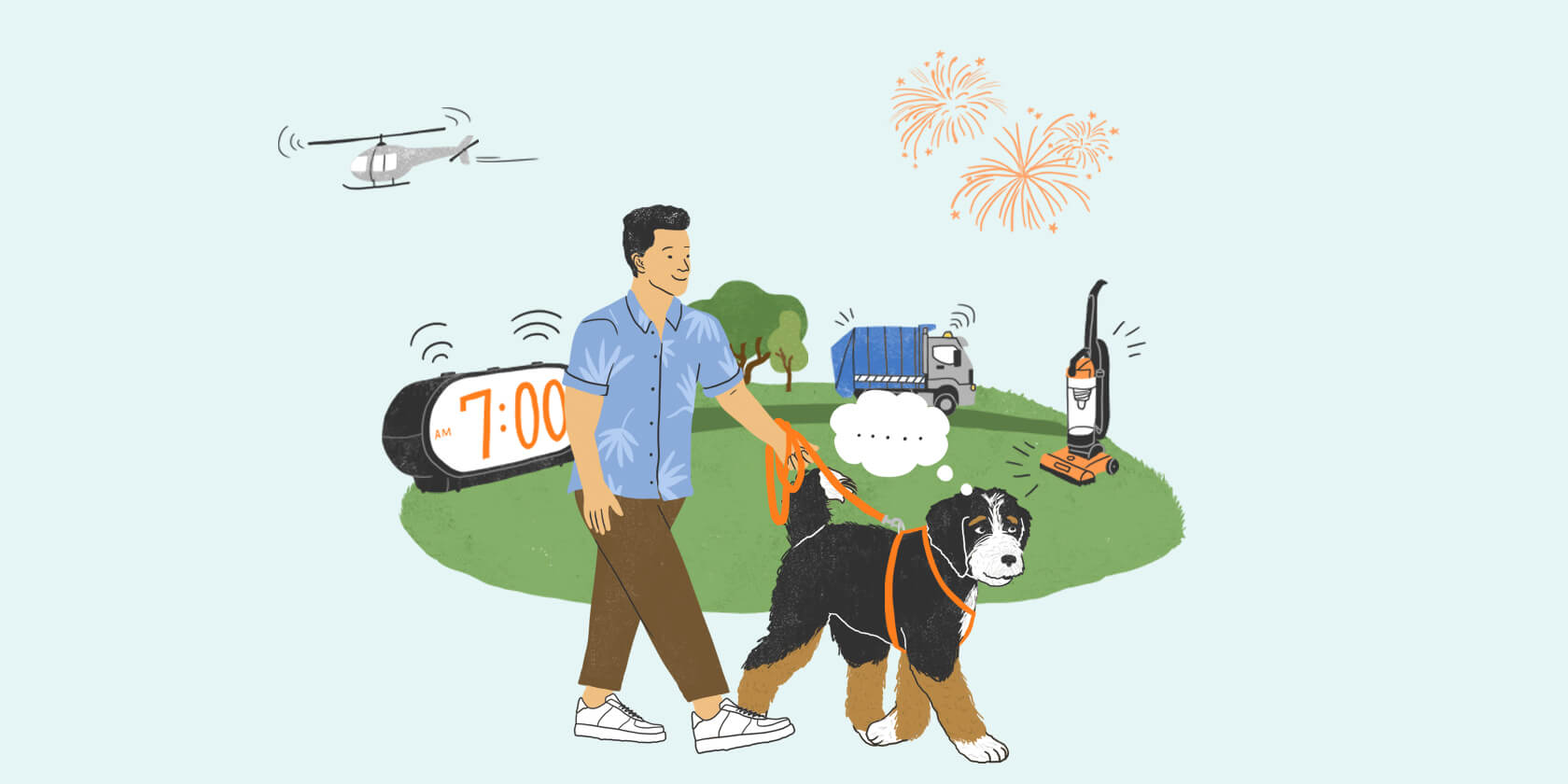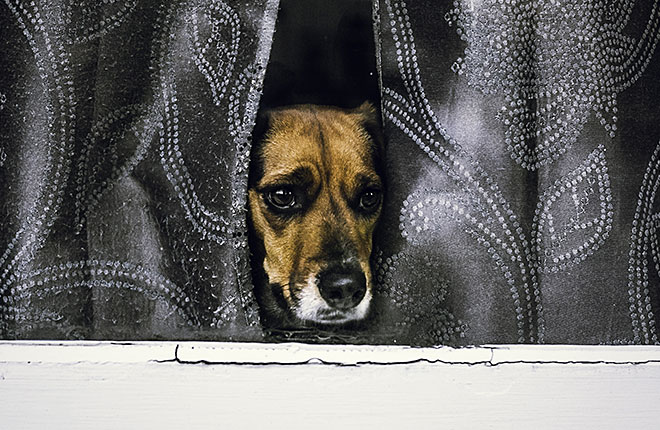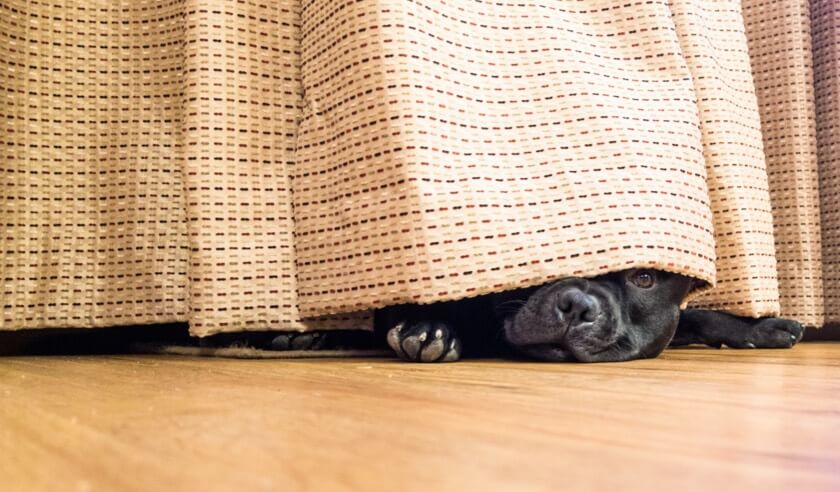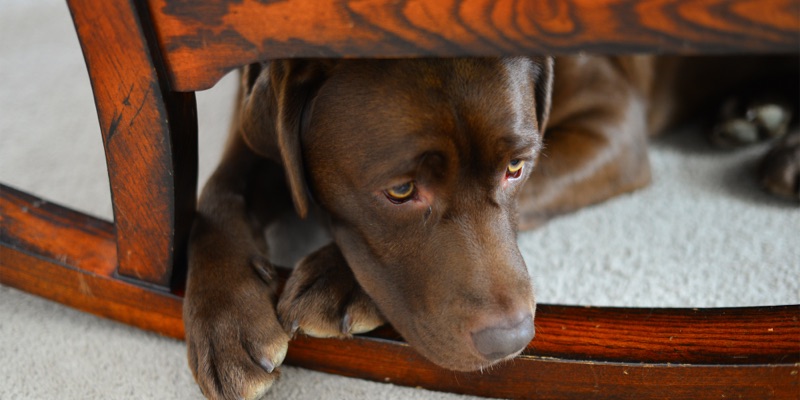If your dog seems like they’re scared of everything, they might be reacting to noises they encounter every day. Many dogs have this fear (2 in 3, to be precise1). If your dog is scared of noises whether these noises occur once or twice per year, like fireworks or thunder, or every day sounds, like loud vehicles or the vacuum, they may have noise aversion.
Canine noise aversion is the fear and anxiety that your dog expresses when they hear loud noises. It can lead to stress, suffering, and potentially destructive behavior or they may injure themselves. Some owners may think that this is normal for their dog, but it is not, and is actually a medical condition.

Everyday Noises That Could Be Scaring Your Dog:
- Construction noises
- Lawn care: lawnmowers, leaf blowers, trimmers, etc.
- Loud vehicles: car horns, garbage trucks, police sirens, snowplows
- Gunshots
- Alarms
- Electronic noises
- Vacuum cleaners
- Noises associated with stadiums or watching sports on TV
- Celebration, such as parties or family gatherings
When your dog is afraid of noises they hear regularly, not only is it stressful for them, but it can add stress to your home. It’s similar to a person undergoing a panic attack, and the crippling fear and anxiety that people with these conditions face is the same type of fear and anxiety that your dog experiences every time they hear a noise that scares them.
A Dog That’s Afraid of Noises May Show Their Fear in Many Different Ways2:
- Pacing or restlessness
- Lip licking
- Trembling or shaking
- Panting
- Excessive alertness or hypervigilance
- Cowering
- Hiding
- Brow furrowed or ears back
- Freezing or immobility
- Owner seeking behavior or excessive clinginess
- Refusing to eat
- Yawning
- Vocalizing (whining or barking at the sounds)
- Escape behaviors
If your dog shows signs of noise aversion, talk to your veterinarian. They can work with you to find a solution to help reduce your dog’s noise aversion and improve your dog’s (and your) quality of life. Many dogs benefit from certain medications that can help to keep them calm, or “below threshold,” when they hear noises that typically cause their fear and anxiety. Delaying a conversation with your vet only increases the time that your dog is suffering from their fear of everyday noises and can increase the frequency and severity of their symptoms2,3. Additionally, your dog may develop other behavior conditions. Take this noise aversion quiz to see if your dog has noise aversion and speak with your veterinarian about the results.
ZPC-00507R1
IMPORTANT SAFETY INFORMATION: Do not use Sileo in dogs with severe cardiovascular disease, respiratory, liver or kidney diseases, or in conditions of shock, severe debilitation, or stress due to extreme heat, cold or fatigue or in dogs hypersensitive to dexmedetomidine or to any of the excipients. Sileo should not be administered in the presence of preexisting hypotension, hypoxia, or bradycardia. Do not use in dogs sedated from previous dosing. Sileo has not been evaluated in dogs younger than 16 weeks of age or in dogs with dental or gingival disease that could have an effect on the absorption of Sileo. Sileo has not been evaluated for use in breeding, pregnant, or lactating dogs or for aversion behaviors to thunderstorms. Transient pale mucous membranes at the site of application may occur with Sileo use. Other uncommon adverse reactions included emesis, drowsiness or sedation. Handlers should avoid direct exposure of Sileo to their skin, eyes or mouth. Always review INSTRUCTIONS FOR USE before dispensing and dosing. See Prescribing Information.
The product information provided in this site is intended only for residents of the United States. The products discussed herein may not have marketing authorization or may have different product labeling in different countries. The animal health information contained herein is provided for educational purposes only and is not intended to replace discussions with an animal healthcare professional. All decisions regarding the care of a veterinary patient must be made with an animal healthcare professional, considering the unique characteristics of the patient.
Sileo® is trademark owned by Orion Corporation Orion Pharma Animal Health. It is manufactured by Orion Corporation and distributed by Zoetis under license from Orion Corporation Orion Pharma Animal Health.
- The Harris Poll: Custom Motion Sickness and Noise Aversion Omnibus Pet Owner Quantitative Research Report, December 2018.
- Zoetis: Foster Rosenblatt Noise Aversion Research; February 5th, 2016.
- Shull-Selcer EA, Stagg W. Advances in the understanding and treatment of noise phobias. Vet Clin Nor Amer: Small Anim Pract. 1991;21(2):353-367.






